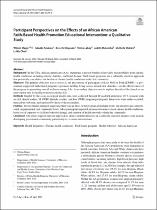| dc.contributor.author | Anakwe, Adaobi | |
| dc.date.accessioned | 2022-08-11T10:29:05Z | |
| dc.date.available | 2022-08-11T10:29:05Z | |
| dc.date.issued | 2022 | |
| dc.identifier.citation | Majee W, Anakwe A, Onyeaka K, Laboy V, Mutamba J, Shikles M, Chen LW. Participant perspectives on the effects of an African American faith-based health promotion educational intervention: a qualitative study. J racial ethn health disparities. 2022 Apr 8:1–12. doi: 10.1007/s40615-022-01299-2. Epub ahead of print. PMID: 35394621; PMCID: PMC8992409. | en_US |
| dc.identifier.uri | 10.1007/s40615-022-01299-2 | |
| dc.identifier.uri | http://hdl.handle.net/10566/7722 | |
| dc.description.abstract | Background In the USA, African Americans (AAs) experience a greater burden of mortality and morbidity from chronic health conditions including obesity, diabetes, and heart disease. Faith-based programs are a culturally sensitive approach that potentially can address the burden of chronic health conditions in the AA community.
Objective The primary objective was to assess (i) the perceptions of participants of Live Well by Faith (LWBF)—a government supported faith-based program to promote healthy living across several AA churches—on the efectiveness of the program in promoting overall wellness among AAs. A secondary objective was to explore the role of the church as an intervention unit for health promotion among AAs.
Methods Guided by the socio-ecological model, data were collected through 21 in-depth interviews (71% women) with six AA church leaders, 10 LWBF lifestyle coaches, and fve LWBF program participants. Interviews were audio-recorded, transcribed verbatim, and analyzed by three of the researchers.
Findings Several themes emerged suggesting there was an efect of the program at multiple levels: the intrapersonal, interpersonal, organizational, and community levels. Most participants reported increased awareness about chronic health conditions, better social supports to facilitate behavior change, and creation of health networks within the community.
Conclusion Our study suggests that one approach to address multilevel factors in a culturally sensitive manner could include
developing government-community partnership to co-create interventions | en_US |
| dc.language.iso | en | en_US |
| dc.publisher | Pubmed | en_US |
| dc.subject | Health disparities | en_US |
| dc.subject | Chronic health conditions | en_US |
| dc.subject | Faith-based program | en_US |
| dc.subject | Health behavior | en_US |
| dc.subject | African American | en_US |
| dc.title | Participant perspectives on the effects of an african american faith-based health promotion educational intervention: a qualitative study | en_US |
| dc.type | Article | en_US |

